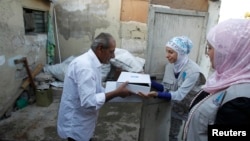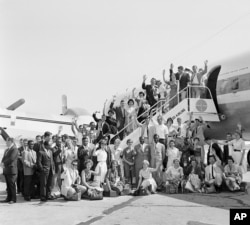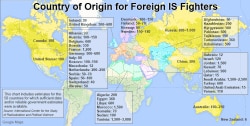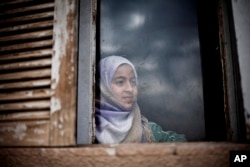The year was 1960, and the world seemed to be on fire: The Cold War was raging, and coups, conflicts and revolutions were taking place across the globe. That October, during the final weeks of his U.S. presidential campaign, then-Senator John F. Kennedy proposed dispatching a volunteer army of youths to non-industrial nations to help foster development and boost cultural understanding. Ten months later, the first Peace Corps volunteers headed for Africa, and since then, more than 210,000 have served in 139 countries.
“I think that they did more good for America than all the bombs we dropped around the world,” said Sami Jamil Jadallah, founder and executive director of the Washington, DC-based New Arab Foundation.
Today, similar conflicts are playing out across the Arab world, and religious extremists, aided by social media, are manipulating and mobilizing vulnerable youth from across the globe.
“Most of the fighters flocking to Syria and Iraq, whether from Chechnya or North Africa or Saudi Arabia, are youth who are politically marginalized, jobless, living in poverty with little self-worth and little hope for the future,” he said.
The solution? An Arab Peace Corps that would recruit volunteers from across the Arab World — Muslims, Christians, North Africa’s indigenous Amazighs, Kurds and others — youth with college degrees in education, health care, engineering and agriculture, and send them to communities in the region most in need of their skills.
Jadallah would also send volunteers to “at-risk” communities in Europe and North America to serve as role models and mentors for troubled youth who are “easy prey” to terror recruiters.
During two years of service, volunteers would receive room and board and a small stipend. After completing their term, they would be given partial and/or full scholarships to graduate school.
“It’s an idea a long time coming,” said Saudi Arabian socio-political commentator Tariq Al-Maeena. “The Arab street that today loiters about aimlessly feeling powerless and detached will probably adopt the idea of a ‘peace corps’ very willingly. They would want to be part of a productive rather than destructive endeavor.”
Maeena thinks the plan is very feasible.
“How Arab governments would respond to the concept is tied to their own agendas," he said. "There are many differences between Arab countries today, as witnessed by the wars currently being stoked."
But he also believes Arab government — especially those in the oil-rich Gulf Cooperation Council — would be “well-served” by funding the program, which, in the end, could function as a “salvation for Arab pride.”
Challenges ahead
Yossef Ben-Meir, a former associate Peace Corps director, is today president of the High Atlas Foundation, a nonprofit working to develop rural communities in Morocco. He outlines some of the challenges that Jadallah might encounter along the way.
“Within Arab nations, there is regionalism,” Ben-Meir said. “There are ethnicities, different languages, and there isn’t always a sense of unity. Assimilation or integration can present challenges.”
Gender could also be an issue, he said.
“There may be more flexibility among women, say, in the U.S., to go off and travel and be a part of another community," he said. "But in some traditional environments or social settings, that opportunity for women to do that may be limited.”
But, he added, none of these obstacles is insurmountable, and they could ultimately benefit everyone.
“When we bring volunteers from within one ethnic background within a country to serve another, that’s an incredible opportunity,” he said. “And encouraging women to volunteer would break down barriers that may need to be broken.”
Ben-Meir says volunteerism is beginning to take hold in the Middle East, and he has first-hand evidence that it pays off — not just in terms of building communities, but in giving marginalized youth a sense of purpose.
“Right now, I have partnerships with four universities in Morocco. At University Hassan II Casablanca, for example, there’s no movement of radicalism there. You don’t find unrest there because students are engaged,” he said.
Jadallah is currently working to seek funding for the project.
“Hundreds of billions of dollars have been wasted on war,” he said, adding that with any luck, governments and private donors will be just as willing to help fund peace.







